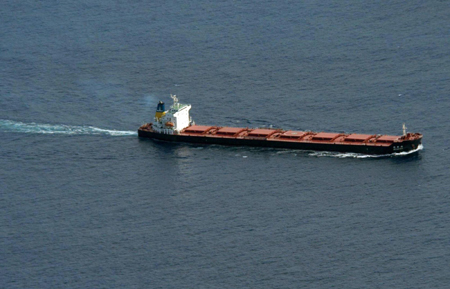China Perspective
Diplomacy, not force, may expedite ship's rescue
By Peng Kuang (China Daily)
Updated: 2009-10-22 09:04
It will be a tough mission to forcefully rescue the Chinese bulk carrier hijacked by Somali pirates ship, Chinese experts said Wednesday, and diplomatic efforts may be needed.
The bulk carrier De Xin Hai was seized Monday in the Indian Ocean. The pirates have threatened to execute the 25 captive Chinese sailors should China's navy attempt a rescue.
|
 |
The pirates were planning to sail the hijacked De Xin Hai ship to either Haradheere or Hobyo, both former fishing villages north of Mogadishu that have become pirate bases, according to Reuters.
China's Foreign Ministry said Wednesday that an all-out effort is underway to recover the hijacked ship and that it was still ongoing. It did not confirm whether warships had been sent to rescue it.
Zhao Xiaozhuo, a military expert for China's Academy of Military Science, said it might help to solve the situation if the Chinese navy can take immediate actions.
"On the high sea, the armed forces have the right to stop any illegal activities like hijacking," Zhao said.
"But if the pirates get on the land, the Chinese navy cannot make operations in Somalia as it is a sovereign state," he said.
Zhao also admitted that the current situation is hard for China's navy.
"When the US navy rescued the hijacked MV Maersk Alabama, they had two advantages - the hijacking happened not so far to a nearby US warship, and the hijacked ship soon lost its power after being hijacked."
"But this time, neither of these conditions is matched." Zhao said.
The number of pirate attacks worldwide rose to 306 between January and September, surpassing the 293 incidents recorded throughout 2008, according to a statement released Wednesday by the International Maritime Bureau's piracy reporting center in Kuala Lumpur.
"After 9/11, the US arranged police officers on the airlines," Zhao said. "It also needs to be considered to make more efforts on self-defense abilities of ships that are facing the threat from pirates."
Some French and Spanish fishing fleets north of the Seychelles were also hijacked in recent weeks, as the pirates range into the Indian Ocean.
The pirates gang said they will not negotiate the release of the Spanish crew until colleagues facing hijacking charges in Madrid are freed.
Zhang Xin and AP contribute to story












